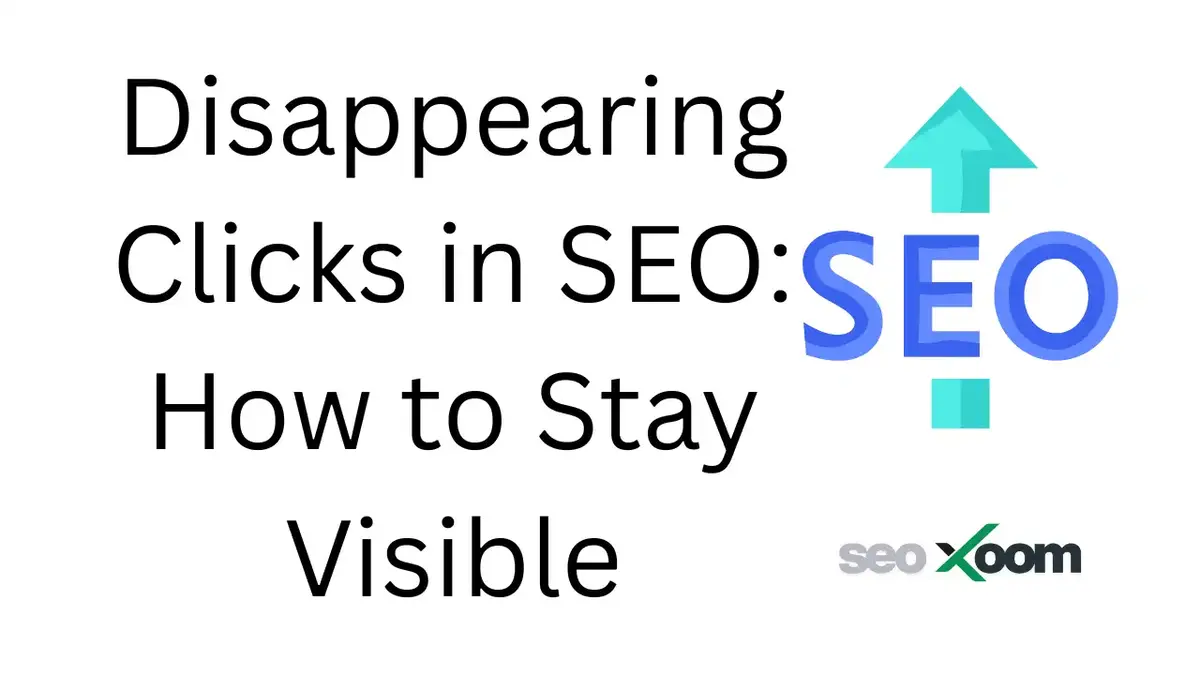Search is changing faster than ever before. Not long ago, search engine optimization (SEO) was all about ranking high on Google and earning clicks. Today, however, a growing number of searches end without a single click. Studies show that nearly six out of ten searches result in no website visits at all. Why? Because users are now getting answers directly from search results, summaries, and other platforms.

For businesses, marketers, and content creators, this shift can feel unsettling. If people no longer click through, how do you maintain visibility, grow your brand, and prove authority? The answer lies in rethinking what SEO means in today’s search environment.
This article will guide you through the changes, explain why clicks are disappearing, and show practical steps to thrive in the new reality.
Why Clicks Are Disappearing
Traditionally, SEO success was measured by website visits. The higher your content ranked, the more traffic you received. But today’s search results pages (SERPs) look different:
- Instant answers: Many queries now show featured snippets, knowledge panels, or summaries that provide answers immediately.
- Answer-rich platforms: Search engines and discovery platforms are pulling information from multiple sources to create complete responses, reducing the need for users to click through.
- Diversified information sources: Platforms like YouTube, Reddit, and industry publications are appearing more frequently in search results, reshaping how users consume information.
The result is that visibility doesn’t always translate into clicks. But this doesn’t mean SEO is dead—it simply means the rules of the game have changed.
The New Definition of SEO Success
SEO is no longer just about rankings and traffic. Instead, it’s about influence, visibility, and credibility across multiple digital touchpoints.
Old SEO Mindset
- Goal: Rank on page one.
- Metric: Clicks and traffic volume.
- Focus: Keywords and backlinks.
New SEO Mindset
- Goal: Be the trusted source that is cited, referenced, and surfaced across platforms.
- Metric: Brand mentions, citations, topical authority.
- Focus: Content depth, expertise, and distribution.
This shift demands a strategy focused not only on attracting traffic but also on embedding your expertise into the broader ecosystem of search and discovery.
Building Authority in the No-Click Era
1. Prioritize Topical Depth
Shallow, surface-level content is no longer enough. To stand out, you need to build content clusters that fully cover a subject.
For example, instead of publishing just one blog about “composting basics,” create a series that covers:
- What composting is
- Benefits of composting
- Common mistakes and troubleshooting
- Seasonal composting tips
- Advanced composting techniques
Interlinking these articles creates a strong signal of authority, increasing your chances of being cited or referenced in search summaries.
Read Also: How to Get Your Website Featured in Answer Engines (AEO Guide 2025)
2. Use Source Attribution in Your Content
When search engines or discovery platforms generate summaries, they often highlight sources that clearly state their ownership of information. Use phrases such as:
- “According to our study…”
- “Based on research from our team…”
- “In our recent survey, we found…”
This not only strengthens credibility but also boosts the chance your brand is mentioned when information is aggregated into summaries.
3. Expand Beyond Traditional Search
Modern search assistants pull content from more than just web pages. To maximize visibility:
- Leverage YouTube: Video content is heavily cited, especially for tutorials, product reviews, and explainer topics.
- Participate in forums: Reddit and other community-driven platforms are being referenced more frequently in search results.
- Distribute content to news and industry outlets: High-quality publications often appear as trusted sources in summaries.
A diversified content approach ensures your expertise is visible in multiple places, even when your website isn’t the primary destination.
4. Optimize for Mentions and Citations
Your name, brand, and website should appear consistently across different platforms. Whether in blog posts, videos, podcasts, or research papers, consistent mentions establish trustworthiness.
Think of it as building a web of credibility. Even if a user doesn’t click your website, your brand presence in their journey builds recognition and authority.
5. Redefine Metrics for Success
Traditional SEO reports often focus on impressions, rankings, and traffic. While these still matter, they don’t tell the full story. In the new search environment, consider measuring:
- How often your brand is cited in summaries or overviews.
- The number of times your content is referenced by other creators.
- Growth in branded search queries (users actively looking for you).
- Engagement across distributed platforms such as YouTube or podcasts.
This broader view captures influence, not just traffic.
Read Also: Perplexity SEO: The New Way to Get Ready-to-Buy Traffic
Practical Strategies for Surviving and Thriving
Create Evergreen Authority Content
Timeless guides, research reports, and how-to articles tend to be reused and referenced across different platforms. Examples include “Complete Guide to Solar Energy for Homes” or “Definitive Manual for Supply Chain Management.”
Embrace Content Variety
Not all users consume information the same way. Expand beyond text into:
- Videos
- Infographics
- Podcasts
- Slide decks
Each format offers another opportunity to be surfaced in discovery systems.
Collaborate With Trusted Sources
Guest contributions, expert interviews, and collaborations with industry leaders amplify credibility. They also expand your reach to audiences outside of your owned channels.
Monitor Where You’re Being Cited
Track when your brand is mentioned across search results, forums, and publications. Tools that monitor citations and mentions can help measure this new form of visibility.
Key Notes for Businesses and Content Creators
- Clicks are not the only measure of success. Influence matters more than ever.
- Topical authority builds trust. Cover subjects in depth, not just surface-level.
- Citations increase visibility. Claim your insights so platforms attribute them to you.
- Diversification is survival. Don’t rely solely on traditional web traffic—spread across video, forums, and publications.
- Measure differently. Track mentions, branded search growth, and cross-platform visibility.
Looking Ahead: The Future of SEO
The landscape will continue to evolve. As search platforms deliver more complete answers directly, the role of SEO professionals, marketers, and creators will be to ensure their brand and expertise are embedded in those answers.
This isn’t the end of SEO—it’s a transformation. Success will belong to those who adapt by focusing on visibility, authority, and influence, rather than traffic alone.
Conclusion
When clicks disappear, it’s easy to feel like SEO is broken. In reality, it’s not broken—it’s changing. The traditional click-through model is giving way to a world where influence outweighs traffic. Brands that embrace this shift by building deep expertise, diversifying content, and prioritizing citations will not only survive but thrive.
SEO has always been about connecting people with the right information. That mission hasn’t changed. What has changed is the path. The winners will be the ones who evolve along with it.



